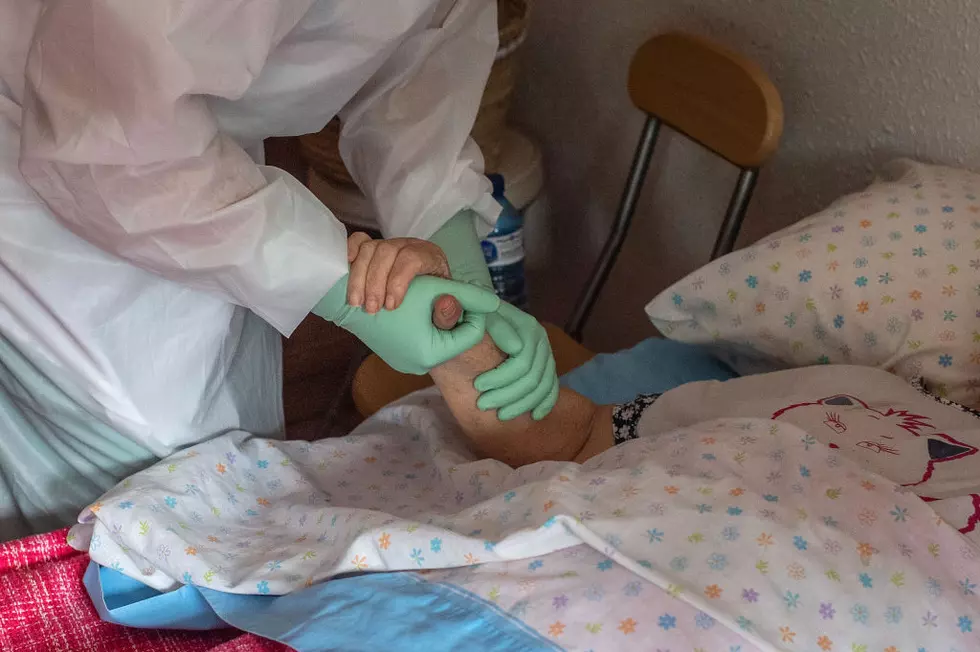
New York Close to Vaccines Needed to Drop Most Mandates
Do you want to stop social distancing? Get vaccinated. That's the message from state officials as New York pushes to finally stop the spread of the coronavirus.
New York is very close to dropping most of the remaining COVID-19 restrictions but it is going to take the cooperation of the handful of vaccination holdouts in the state in order for everyone to be able to toss out social distancing, disinfection routines, health screenings and offering up information for contact tracing.
Governor Cuomo says once 70 percent of New Yorkers age 18 and older have received their first dose of vaccine, the mandates can go. According to federal data, about 68.7% of New York adults have had at least one dose.
New York State, some businesses like major league sports and some localities have been offering a variety of incentives to try to get lagging vaccinations numbers to pick back up. It’s hoped just dangling the prospect of doing away with a majority of restrictions that continue to shackle normal life will be sufficient to push enough of the hesitant into getting the shot to stop the immergence of new variants of the virus and achieve herd immunity.

Once the 70 percent is reached, the New York Forward guidelines will become optional for retail, food services, offices, gyms, amusement parks, entertainment venues, salons and other commercial settings.
Transportation, nursing home locations and hospitals will still following state guidelines.
Governor Cuomo's office lists the current summary health guidelines that apply across most commercial and social settings, many of which may be lifted after the targeted vaccination rate is achieved:
- Capacity - Capacity is only limited by the space available for individuals or parties of individuals to maintain the required social distancing based on vaccination status. For fully vaccinated individuals/parties, no social distancing is required.
- Businesses may require proof of full vaccination status through paper form, digital application, or the State's Excelsior Pass. Alternatively, businesses may rely upon self-reporting of vaccination status.
- Distancing - Fully vaccinated individuals do not need to be socially distanced and unvaccinated/unknown individuals need to maintain six feet of social distance. In lieu of six feet of social distance, appropriate physical barriers may be used so long as they do not present a health or safety hazard.
- Masks - Fully vaccinated individuals do not need to wear masks and unvaccinated/unknown individuals need to wear masks. Unvaccinated/unknown individuals may only remove their mask indoors while socially distanced, seated, and eating/drinking and outdoors while maintaining social distancing of six feet and, if in an event or gathering setting, seated.
- Hand Hygiene - Hand hygiene stations or supplies must be provided for individuals to use; specifically, hand washing, such as soap, running water or disposable towels or hand sanitizing, such as alcohol-based sanitizer with 60 percent or more alcohol where hand washing may not be available or practical.
- Cleaning and Disinfection - Clean and disinfect high-touch surfaces at least once a day, such as common areas and shared workstations and regularly clean and disinfect other surfaces as necessary given the level of traffic and type of individuals who use the space and general risk of community transmission of COVID-19.
- Communication - Clearly communicate to individuals through signage, markers, and other applicable methods the health precautions that are in effect within the specific setting based upon these principles and any other restrictions that the business may choose to implement, such as capacity limits, social distancing, masks, or hand hygiene.
- Ventilation and Air Filtration - For indoor environments, increase outdoor airflow and ventilation rates to the extent compatible with individual comfort and safety, in accordance with building codes and standards; in indoor areas where air is recirculated, ensure HVAC system filtration meets the highest rated filtration compatible with the currently installed filter rack and air handling systems, ideally a minimum of MERV-13, industry equivalent, or greater, as applicable for the specific environment; and deploy other appropriate indoor air quality measures and engineering controls, such as portable fans, filters, and air cleaners as necessary.
- Gatherings and Events - For gatherings or events that exceed the State's social gathering limit of 250 indoors or 500 outdoors, these additional provisions apply, consistent with the State's implementation of the CDC guidance:
- Proof of Vaccination - For any setting where there is a concentrated gathering of persons above the social gathering limits without social distancing, proof of vaccination status must be required; self-reporting of vaccination status cannot be used. Event venues can operate up to 100 percent capacity so long as all attendees are fully vaccinated, consistent with applicable federal and state laws and regulations.
- To attend indoor events above the gathering limit, attendees over the age of four who are not presenting proof of full vaccination status must instead present proof of recent negative COVID-19 test result, such as a PCR/NAAT test within 72 hours or antigen within 6 hours prior to admission. Outdoor events do not require proof of recent negative COVID-19 test result for unvaccinated/unknown individuals.
- Health Screening - All individuals must be health screened for COVID-19 symptoms, recent close contacts, and recent positive COVID-19 test result, prior to, or immediately upon, arrival to the event. Screening may be performed via signage, at ticket purchase, by e-mail/website, by telephone, or by electronic survey before individuals enter the event space. Temperature checks are no longer required.
- Contact Information - At least one individual from each party of attendees should sign-in during ticketing, or before or immediately upon entering the event space, providing their name, address, and phone number or e-mail address for use in potential contact tracing efforts. Sign-in process may be conducted through any means, including but not limited to a digital application and/or paper form. Sign-in data should be maintained for a minimum period of 28 days and made available to state and local health departments upon request.
Photographer Captures Solitude Sweeping Southern Tier
More From WNBF News Radio 1290 AM & 92.1 FM









